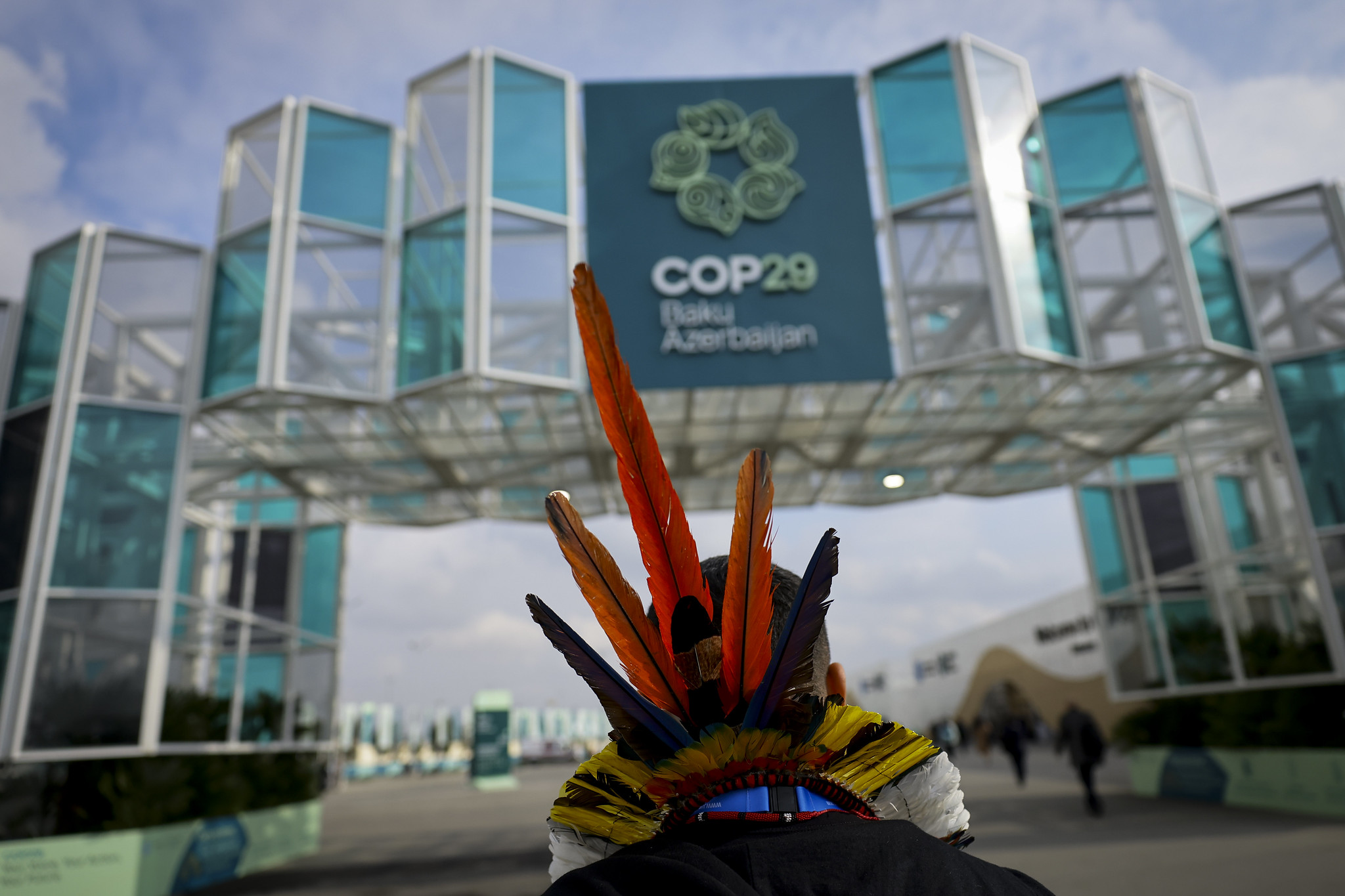COP29 Week 1 Wrap-Up: an Article 6 win, Brazil and UK NDCs on the field, yet nature remains on the bench

Photo: Apex Brasil
We are finally halfway through COP 29. In the first week of the climate summit, dubbed the ‘Finance COP’, nature’s presence in the negotiations was as scarce as sunlight for those roaming inside the built walls of the Baku ‘Olympic’ Stadium. As decisive as the second of the three Rio Conventions’ Conferences of 2024 is to unlock much-needed finance and implementation of efforts to combat climate change, much has been left for the final run. But the ball is still rolling.
After a short break, Parties and non-state actors return to the field in a final attempt to tackle what matters the most: Who can finance the action we need? What’s the lineup for the last round of NDCs?
If, like us, you are also placing all your bets on the second week, here are some top takeaways to help you keep your eyes on the prize:
Read more
Related articles for further reading
MVPs of the week: starring Brazil and the United Kingdom
Brazil and the United Kingdom showed up ahead of the game, presenting their updated nationally determined contributions (NDCs) three months before the deadline.
The UK pledged an 81% reduction in emissions by 2035 compared to 1990 levels, reaffirming its commitment to international climate finance with £3 billion earmarked for nature, including £1.5 billion for forest conservation. (Read the WWF-UK and WRI joint comment in response to the UK’s pledge). The UK also announced USD 16 million to the Africa Go Green Fund which in the past has helped finance cleaner cooking initiatives across the continent.
Host of the next UNFCCC COP, Brazil, announced a new climate goal at COP29, aiming for a 59% to 67% reduction in economy-wide greenhouse gas (GHG) emissions by 2035, compared to 2005 levels. This target translates to a reduction of 850 million to 1.05 billion tons of carbon dioxide equivalent by 2035.
Indigenous leaders from Brazil, Australia, and the Pacific launched ‘The Troika of Indigenous Peoples,’ advocating for Paris Agreement implementation aligned with their self-determination and territorial rights. Brazilian Minister Sônia Guajajara called for expanded Indigenous representation at COP30 in Belém, emphasizing the need for direct involvement in negotiations.
Match point for carbon markets
Another important highlight of the week, COP29 scored early with an endorsement of a global carbon market framework under Article 6. This move aims to establish clearer standards for trading carbon credits and ensure accountability in climate finance. Despite initial concerns about governance and equity, this early agreement marks progress, allowing negotiators to focus on finalizing guidance for Articles 6.2 and 6.4.
The Integrity Council for the Voluntary Carbon Market also took a significant step by approving three methodologies for generating high-integrity carbon credits aimed at reducing emissions from deforestation and forest degradation in developing countries (REDD+). This milestone marks the beginning of a new era for the high-integrity forest carbon market, underscoring the vital role of nature conservation as a recognized and fundable climate mitigation strategy within the voluntary carbon market.
Florence Laloe, Senior Director of Climate Policy at Conservation International, commented:
“The approval of the new 6.4 standards moves the market closer to becoming fully operational, overcoming a process roadblock. Parties can now focus on other necessary elements during the rest of COP29, such as authorizations under Articles 6.2 and 6.4 and the international registry. Science shows it is mathematically impossible to meet global climate goals without nature. It is imperative that countries provide additional guidance at this COP to improve these standards and ensure that new tools developed for Article 6.4 do not exclude or hinder nature, keeping all sectors on an equal playing field.”
Scrum for forests
This week, the Forest and Climate Leaders’ Partnership (FCLP) highlighted progress on six country packages and reported that, over the first three years of the Global Forest Finance Pledge, the 11 participating governments and the European Union have collectively contributed USD 10 billion towards the USD 12 billion initially committed for forest conservation and restoration activities.
A joint statement by 14 countries -Costa Rica, Ethiopia, Fiji, France, Ghana, Guyana, Kenya, Nigeria, Norway, Pakistan, Peru, Vietnam, the United Kingdom, and the United States – reaffirmed commitments to REDD+ goals and emphasized fair pricing mechanisms to value the environmental and social benefits of forest carbon. Indigenous rights and local community inclusion remained central to the discussions, signalling a push for equitable forest conservation strategies.
Honorable Mention – US President Joe Biden took his first trip to the Amazon to launch the new Brazil Restoration & Bioeconomy Finance Coalition (BRB Finance Coalition) to accelerate the conservation and restoration of Brazil’s forests, with a targeted, aggregate investment of at least $10 billion by 2030 among all Coalition members. Founding members include Agni, Banco do Brasil, BNDES, Biomas, BTG Pactual, Conservation International, the U.S. International Development Finance Corporation, IDB Invest, Instituto Arapyaú, Instituto Clima e Sociedade, Instituto Itaúsa, Mombak, The Nature Conservancy, Regia Capital, re.green, the World Bank Group, and the World Economic Forum. Biden also announced several other efforts to support the Amazon including a USD 50 million investment in the Amazon Fund, a $37.5 million loan and other investments in large reforestation projects, and voiced support for Brazilian President Lula’s Tropical Forest Forever Facility.
Week 2 look out:
As heads of state and high-level representatives move onto other agendas (enter, the G20), negotiators take the field to try to reach an agreement and secure a win at the 29th conference of parties. The prize is grand – whether this is worth 200 billion or 1 trillion US dollars remains undecided. Nature, so far, has been left on the bench. But with ‘Nature Day’ scheduled for the day before the last (21st), there is still a chance to see a turnaround game at the last minute.
Worth reminding:
The Nature4Climate coalition is urging leaders in Baku to:
- Triple finance for nature by 2030 to meet climate and biodiversity goals.
- Create ambitious and investable NDCs to attract private sector capital into nature-based solutions.
- Harmonize and align plans, policies, and budgets across the Rio Conventions ahead of COP30 for cohesive action.
📅 Nature4Climate has developed a COP29 Nature-Related Event Tracker to make it easier to stay updated on where and when more than 250 nature-focused sessions will take place. Check out the tracker, and if you have events to add, please send details to comms@climateadvisers.org.
In case you missed it – other important COP29 nature plays:
- Bhutan, Comoros, Madagascar, Panama and Suriname – a group of carbon-negative countries – launch the G-ZERO Forum to ignite a new global momentum for a net-zero, climate-resilient, and nature-positive world, leveraging unique voices, perspectives, and capabilities of climate-negative and carbon-neutral countries.
- Multilateral development banks (MDBs) issued a joint statement at COP29 that shares their estimate that by 2030, their annual collective climate financing for low- and middle-income countries will reach USD 120 billion, including USD 42 billion for adaptation, and MDBs aim to mobilize USD 65 billion from the private sector.
- The Inter-American Development Bank (IDB) announces it will scale climate investments in Latin America and the Caribbean by USD 11.3 billion annually by 2030.
- Singapore’s Economic Development Board (EDB) announces pledges of USD 500 million to accelerate capital flows.
- Ivory Coast is setting up a USD 500 million green-financing facility to catalyze funding to combat climate change backed by the African Development Bank and the Climate Investment Funds.
- The Herald Ghana reports that Ghana’s President Nana Akufo-Addo announced at COP29 that Ghana has received over USD 800 million by trading carbon credits with Switzerland and Sweden in a move to reduce global emissions through the carbon markets.
- Tree Aid, together with the Alliance of Bioversity International and CIAT, supported by the CGIAR Research Initiative on Climate Resilience launched a new report at COP29 that finds the total climate finance gap for agriculture and land use across Africa will total USD 55.47 billion by 2030. Whilst funding is on an upward trend, funding levels for Africa remain critically inadequate for the agriculture, forestry, and land use (AFOLU) sector.
- Brazil presented its Climate Investment and Ecological Transformation Platform (BIP) aiming to mobilize national and international capital to support climate transition and ecological transformation plans. According to the government, the initiative will coordinate projects in biodiversity, bioeconomy, renewable energies, and decarbonization, acting as a bridge between investors and plans from various ministries.
- The Brazilian state of Tocantins submitted its Trees Registration Document (TRD) during an event at COP29 yesterday, advancing its process to become eligible to issue ART TREES credits and announced it is pursuing the sale of more than USD 430 million in carbon credits related to forest conservation through 2030.
- BTG Pactual Timberland Investment Group announced it has crossed the USD 500 million milestone on its way toward its goal of mobilizing $1 billion for its Latin American Reforestation Strategy.
- Mission 2025 – a coalition of of the world’s leading businesses, investors, subnational governments, scientists and data experts, and civil society leaders – launches a new global campaign asking G20 leaders to agree upon a high-ambition Collective Quantified Goal on Climate Finance at COP29 in order to set up a successful COP30 and to publish high ambition Nationally Determined Contributions.
- TV Indígena launches as a new multi-media platform dedicated to making visible the culture, knowledge and traditions of the Indigenous Peoples of the world. You can find them and follow their coverage on YouTube, Instagram, Facebook and Twitter.
